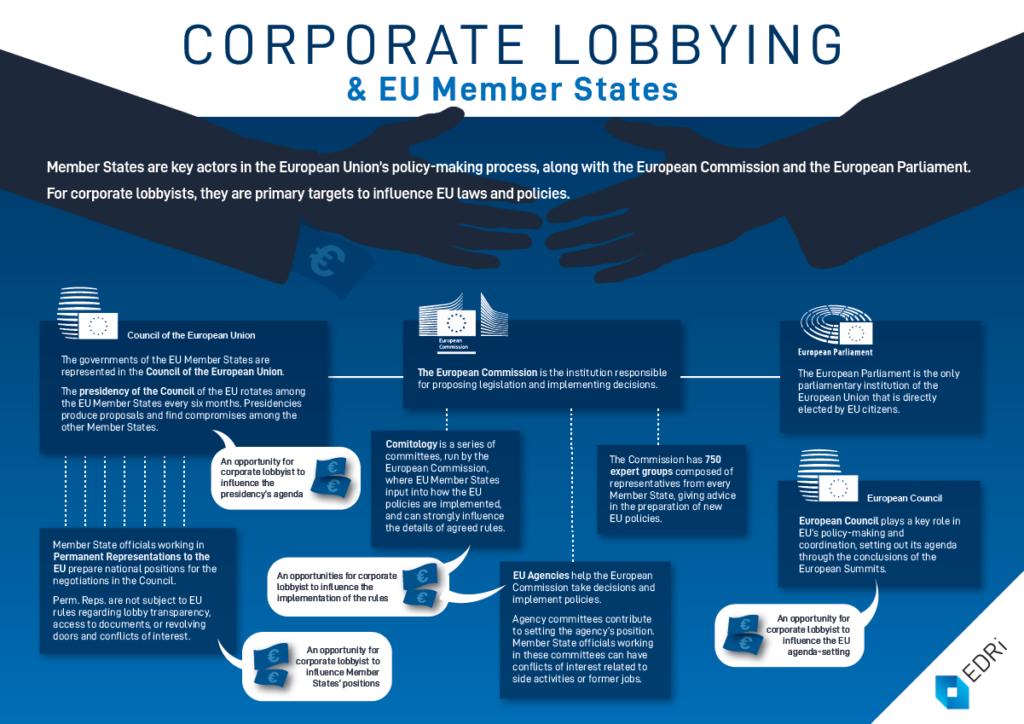Captured states – e-Privacy Regulation victim of a “lobby onslaught”
Compared to non-governmental organisations and trade unions, private corporations are far better equipped to influence European level decision-making. A report “Captured states: when EU governments are a channel for corporate interests” by Corporate Europe Observatory’s (CEO) describes the various ways corporations approach the Member States of the European Union to maximise their impact.
When adopting EU’s laws and policies, Member States are key actors, along with the European Parliament and the Commission. Thus, lobbyists representing private corporations consider Member States as primary targets to influence the decisions at the European level in favour of their interests. The CEO report exemplifies how national governments become channels for corporate interests by relating numerous lobbying successes, including the e-Privacy Regulation (pdf).
The report maps out the various channels and decision-making fora that the EU, national-level trade associations, and multinational corporations target to push for their private interests. This includes the European Council, the rotating presidencies of the Council of the EU, the EU technical and scientific committees, and officials working at the permanent representations of Member States. Corporate lobbies also use the services of Brussels-based lobby consultancy firms to receive advice and to multiply lobby opportunities and accesses. As a result, and in comparison to the influence of NGOs, Corporate Europe Observatory finds a massive asymmetry in terms of lobbying capacity and resources.
ePrivacy Regulation – a case story of “corporate hyperbole”
As the case of the e-Privacy Regulation proposal outlines, the deeply problematic issue of corporate capture also threatens citizens’ fundamental rights in the digital sphere. Regulating the use of personal data by advertisers, publishers, and social media platforms, the proposal has been the victim of “a veritable lobby onslaught” by corporate lobbies with an interest in Big Data. An official following the e-Privacy file said that “99 per cent of the lobbying” had been from industry. These lobbying efforts have been so far successful in delaying negotiations and the adoption of the update of the only piece of privacy legislation in place in the EU. As a result of this pressure from private interests, the proposal is stalled by Member States, and EU citizens do not enjoy the full protection of their private communications online.
The report focuses on the German position and reveals the imbalance of representation in meetings with German officials between NGOs and industry lobbyists such as the publishing corporation Axel Springer, Deutsche Telekom, Facebook, and Google. The German government has been keen on defending its key telecom operator Deutsche Telekom’s demands, in particular asking for the processing of personal data on a pseudonymous basis and without consent.
Countering corporate influence and saving democracy
The report lays down primary ideas to reduce the impact of corporate lobbying on European legislative outcomes. These include:
- Adopting national rules to prevent privileged access for corporate lobbies and to promote full lobby transparency.
- Strengthening national parliamentary pre-decision scrutiny and post-decision accountability on government decision-making at EU level.
- Reforms of the ways of working of the Council of Ministers, the European Council and the European Commission’s committees and expert groups to solve the democratic deficit.
- Introducing new models of participation for citizens, such as participatory hearings on upcoming pieces of EU legislation, and improving and increasing key online consultations.
In addition to these issues raised by CEO, EDRi has repeatedly voiced criticism with regards to the transparency of trilogues – which are informal, non-democratic and non-transparent negotiations to fast-track adoption of legislation – and transparency of the Council of the EU, whose “confidential documents” are difficult to access, and whose working parties discussions are still taking advantage of significant opacity.
Without greater transparency and fairness of the process, civil society work will remain difficult, and corporate interests will continue to reign over public interests.

Infographics: Corporate lobbying & EU Member States
https://edri.org/files/Corporate-lobbying_EU-MS_web.pdf
Council continues limbo dance with the ePrivacy standards (24.10.2018) https://edri.org/council-continues-limbo-dance-with-the-eprivacy-standards/
How the online tracking industry “informs” policy makers (12.09.2018)
https://edri.org/how-the-online-tracking-industry-informs-policy-makers/
European Ombudsman shares EDRi’s concerns on Council transparency (21.02.2018)
https://edri.org/european-ombudsman-shares-edris-concerns-on-council-transparency/
EDRi’s response to the European Ombudsman consultation on transparency of legislative work within Council preparatory bodies (20.12.2017)
https://edri.org/files/consultations/euombudsman_counciltransparency_20171212.pdf
(Contribution by Chloé Berthélémy, EDRi)

